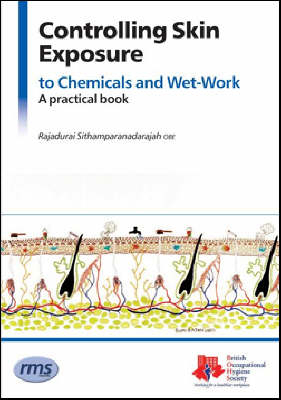
Controlling Skin Exposure to Chemicals and Wet-work - a Practical Book
RMS Publishing (Verlag)
978-1-906674-00-7 (ISBN)
- Titel ist leider vergriffen;
keine Neuauflage - Artikel merken
Although there have been two decades of real progress in research and standards on dermal exposure risk management (DERM) issues, the knowledge mainly remained with those who have academic and/or research interests. Therefore, this book is written to fill a gap. The 'It's In Your Hands(copyright)' campaign was jointly mounted by the Health and Safety Executive (HSE) and the British Safety Industry Federation (BSIF), with the support of the British Occupational Hygiene Society (BOHS), the Institute of Occupational Medicine (IOM), the International Institute for Risk and Safety Management (IIRSM), the Safety Groups UK (SGUK), the Scottish Chamber of Safety (SCOS) and the Trade Union Congress (TUC), to promote improved skin care in industrial and commercial organisations. The objective of the campaign is to significantly reduce the incidence of work-related dermatitis by controlling skin exposure to chemicals and wet-work.Controlling skin exposure to chemicals should also help to reduce systemic diseases. From the success of the campaign came the idea to expand the breadth and depth of the material and produce a practical book dealing with control of dermal exposure.
The aim was to provide practical guidance for health and safety professionals, especially those in frontline health and safety management and those preparing for professional health and safety qualifications. Furthermore, it should prove a valuable and a lasting resource for professionals wishing to raise health and safety standards at work. The text within provides an introduction to the structure and functions of the skin, regulatory requirements related to dermal exposure at work, exposure and risk assessment and, finally, risk management strategies.While it is comprehensive it is also accessible and the author (Dr Rajadurai Sithamparanadarajah OBE JP PhD CChem MRSC MFOH - HSE, UK) has remained true to his aim of producing a book that is of practical use to hygienists and others. The information in this book is not only relevant to the industrial hygienist, but into the domain of dermatology, dermatologic research, public health, occupational medicine, toxicology, dermatotoxicology and analytical chemistry.
It synthesises several vast databases and provides a highly and readily adapted practical approach to prevent not only skin disease, but systemic manifestations of percutaneous penetration. It is our hope that this book's general acceptance will rapidly lead to frequent editions - demonstrating what will surely be an important decade of research and clinical application.The BOHS in association with RMS Publishing are pleased to publish this book, which is believed will make an important contribution to increasing knowledge about control of dermal exposure and encourage more effective dermal exposure control measures to be introduced in workplaces and as a consequence see a reduction in risks.
Summary of key issues covered within this publication: the structure and functions of the skin; reasons for establishing a healthy skin policy; guidelines for wet-work; examples of occupations and chemicals that are of concern for irritant and allergic contact dermatitis; examples of chemicals that are of concern for dermal uptake and systemic disease; a practical description of dermal exposure pathways; a sample letter to manufacturers/suppliers of chemicals to seek up-to-date health and safety information; and, practical uses of the Tyndall lamp - dermal exposure, surface contamination and biological monitoring.This work also covers: a control approach known as 'APC'. APC stands for - Avoid skin contact; Protect the skin; and, Check for early signs of disease; the need to apply the 'principles of good control practice' for adequate dermal exposure control; the need to develop adequate safe working distance (SWD) between the contaminant and the skin; the importance of information, instruction and training, employee participation and evidence-based practices for benefits realisation; and, a section entitled 'Test Your Knowledge'.
Part 1Human Skin and the Effects of Chemicals Chapter 1 Human SkinChapter 2 Protective Functions of Human SkinChapter 3 Diseases Caused by Dermal Exposure to ChemicalsChapter 4 Occupations, Chemicals and DiseasesPart 2 Dermal Exposure to Chemicals and the LawChapter 5 Dermal Exposure Control and Regulatory RequirementsPart 3 Dermal Exposure Hazard and Risk IdentificationChapter 6 Dermal Exposure PathwaysChapter 7 Dermal Hazard Identification MethodsChapter 8 Dermal Exposure and Surface Contamination MonitoringPart 4 Dermal Exposure Risk ManagementChapter 9Dermal Exposure Risk Management Chapter 10Avoiding Contact with the SkinChapter 11Protecting the Skin with PPEChapter 12Personal Hygiene and Skin ProtectionChapter 13Checking for Early Signs of DiseaseChapter 14Benefits RealisationAppendicesAppendix 1Glossary of TermsAppendix 2 Principles of Sensible Risk Management
| Erscheint lt. Verlag | 30.6.2008 |
|---|---|
| Zusatzinfo | 100+ - Full colour photos, diagrams, and tables |
| Verlagsort | Stourbridge |
| Sprache | englisch |
| Maße | 210 x 297 mm |
| Themenwelt | Medizin / Pharmazie ► Medizinische Fachgebiete ► Dermatologie |
| Studium ► Querschnittsbereiche ► Prävention / Gesundheitsförderung | |
| Wirtschaft | |
| ISBN-10 | 1-906674-00-0 / 1906674000 |
| ISBN-13 | 978-1-906674-00-7 / 9781906674007 |
| Zustand | Neuware |
| Informationen gemäß Produktsicherheitsverordnung (GPSR) | |
| Haben Sie eine Frage zum Produkt? |
aus dem Bereich


